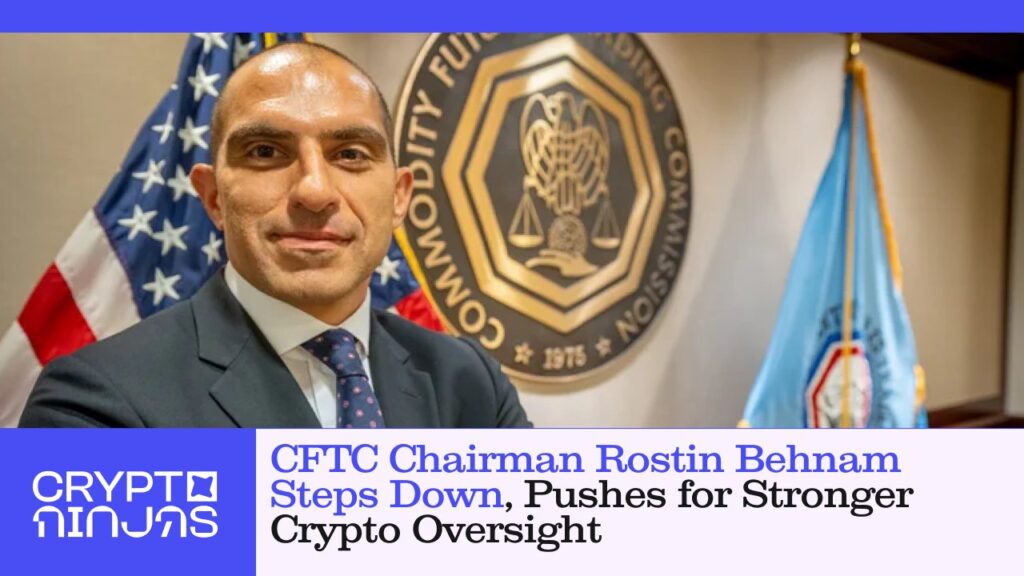Key points to remember:
- Rostin Behnam is stepping down as CFTC Chairman on January 20, after a tenure focused on regulating the crypto market.
- He warned that many cryptocurrencies are commodities and should be under the jurisdiction of the CFTC.
- Behnam also raised concerns about political betting markets and called for stricter rules.
Changing of the guard at the CFTC!
Rostin Behnam’s term as head of the Commodity Futures Trading Commission (CFTC) is coming to an end. He officially resigns January 20the same day President Trump took office. Her resignation marks the end of a four-year term filled with high-stakes enforcement actions and calls for stricter crypto regulations.
Behnam was known for his tough stance on digital assets, often arguing that the market needed more structure and stronger oversight. He has repeatedly warned of regulatory gaps that expose investors to risk.
A strong advocate for crypto regulation
Behnam spent much of his time as president promoting greater control over cryptocurrencies. He believes many digital tokens are commodities, which would put them under scrutiny Jurisdiction of the CFTC. However, unclear laws and overlapping agency responsibilities have left much of the crypto market in a state of confusion. regulatory gray area.
Much of the digital asset market remains unregulated, Behnam said in an interview with the Financial Times. He pointed to growing interest from retail and institutional investors as evidence that now is the time to establish clear rules. Without better regulation, he argued, the market will continue to face transparency issues, financial risks and threats of fraud.


Rostin Behnam
Behnam’s position has been a defining element of the CFTC’s recent strategy. His calls for stricter oversight have paved the way for ongoing debates over how to classify and manage digital assets.
High-profile cases defined his mandate
Behnam’s leadership was not limited to political discussions. Its CFTC has taken aggressive enforcement actions, including a $4.3 billion settlement with Binance. The agency accused Binance of offering crypto derivatives without a license in the United States and violating anti-money laundering rules.


Binance’s $4.3 billion fine
This case showed how far Behnam was willing to go to enforce existing laws. It also revealed how far some crypto platforms had strayed from compliance.
Despite this and other major victories, Behnam frequently emphasized the need for clearer and more comprehensive regulations. He argued that law enforcement alone cannot solve market problems: there must be a strong legal framework that defines what is allowed and what is not.
Warning regarding political betting markets
Crypto wasn’t Behnam’s only concern. He also sounded the alarm about the rapid increase in political betting markets. These platforms allow people to bet on sensitive issues like elections, assassinations and terrorism.
Behnam described this as a troubling development, warning that the line between legal and illegal activities becomes more and more vague. “The boundaries are moving,” he said, calling for new rules to manage risks. He urged his successor to make regulating political betting a priority.
What happens next?
Behnam’s departure raises big questions about the future of the CFTC. Who will direct it next?
A name that circulates is Brian Quintenza former CFTC commissioner who now works at a16z. Quintenz is a staunch defender of cryptographic innovation and believes that overregulation stifles growth. His appointment would mark a significant departure from Behnam’s stricter approach.


Brian Quintenz, former CFTC commissioner who now works at a16z
At the same time, Paul Atkinsa known crypto proponent, was chosen to lead the SEC. This combination could create a more crypto-friendly regulatory environmentsparking new debates about the scope of surveillance.


Paul Atkins
More news: Paul Atkins: the new president of the SEC and the fate of an American cryptocurrency market which remains precarious

